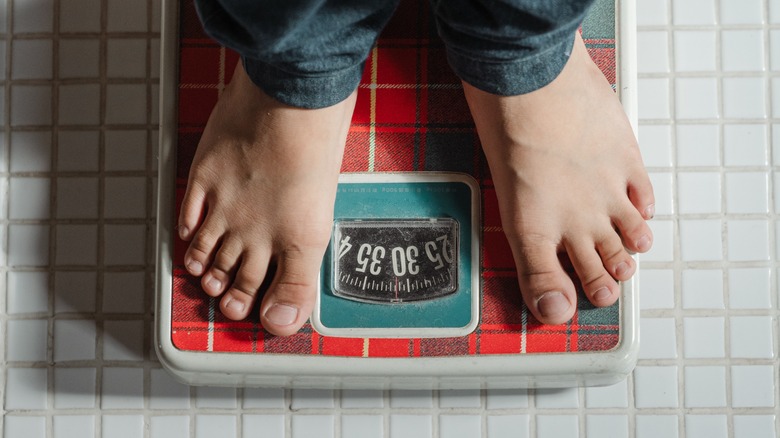How IBS Can Impact Your Weight
If you frequently have gastrointestinal symptoms such as stomach cramping, pain, diarrhea, constipation, gas, and bloating, you may have irritable bowel syndrome, commonly known as IBS (via MedicalNewsToday). Although IBS is a common gastrointestinal (GI) disorder, according to the Cleveland Clinic, researchers don't know exactly what causes it. There are a number of theories, however, including problems with how your GI muscles contract to extra-sensitive nerves in the GI system.
IBS can have a drastic impact on your quality of life, according to a 2022 study published in the Journal of Psychosomatic Research. The study showed that IBS patients noted a lower quality of life than those who did not live with the condition. A 2017 study published in Health and Quality of Life Outcomes showed that IBS patients experienced increased anxiety, depression, and decreased productivity at work. However, IBS could also indirectly impact your life when it comes to your waistline.
Your diet can impact IBS
In general, IBS as a condition should not directly cause weight loss or weight gain, but the way it affects your diet and lifestyle can be a factor (via MedicalNewsToday). In certain cases, some patients with IBS will avoid trigger foods, like fruits and vegetables, in favor of more easily-digestible foods like pasta, rice, and white bread. The problem there is that these foods are high in caloric content, leading to weight gain.
Additionally, people with IBS can sometimes find that their symptoms are triggered by physical activity (via the Gastro Center of New Jersey). Exercises like jumping or running can exacerbate intestinal distress, leading people with IBS to avoid these kinds of activities. As a result, the lack of physical activity, coupled with an improper diet, can lead to weight gain.
On the other side of the coin, weight loss symptoms related to IBS can stem from patients avoiding eating in the hope of preventing abdominal pain and cramps (via Healthline). A doctor may also recommend a low FODMAP diet, which stands for fermentable oligo-di-monosaccharides and polyols. High FODMAP foods tend to be high in fructose and lactose, which can cause IBS symptoms. Patients on a low FODMAP diet may find it easier to lose weight.
Your hormones could be at fault
There could also be a hormonal link to your IBS and weight gain. A 2015 study published in the World Journal of Gastroenterology found that certain hormones residing in the gut that regulate weight were at abnormal levels in IBS patients. These abnormal levels may result in increased appetite and a higher food intake.
You may also be experiencing food-related anxiety as a result of your IBS symptoms. A 2019 study published in Gastroenterology & Hepatology found that patients who lived with IBS demonstrated a wide range of behaviors that could lead to weight loss. These included skipping meals and limiting food intake.
If you have IBS, it's recommended that you stick to a diet of several small meals versus large meals (via Healthline). You also want to avoid foods that have been known to exacerbate IBS symptoms, including beans, cabbage, fried foods, and foods that are high in fat. It may be wise to keep a food journal to help you identify what foods may be triggering your symptoms. You should consult with your doctor about your IBS and resultant symptoms. They can help determine the best diet to keep your gut health and weight in check.



